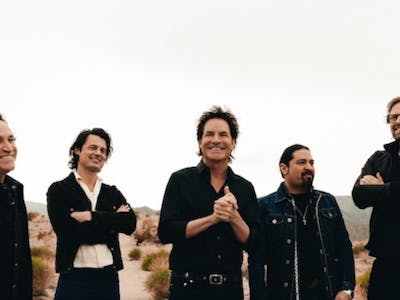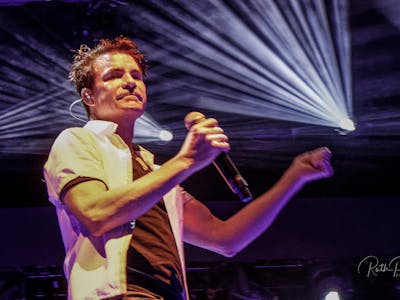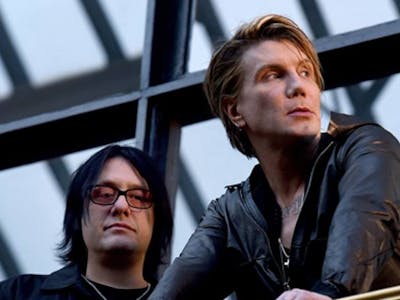The Goo Goo Dolls were formed in 1986 and were shaped by a lot of my favorite bands from that era– Husker Du, Soul Asylum, and most of all, The Replacements. Strong songwriting, passion and drive resulted in them breaking through with the extraordinary “Name” and the smash “Iris”. Strong work ethic and a no-nonsense Buffalo mindset have kept them in the game ever since. Like all those bands, their songwriting and sound has continued to evolve over their catalog. There’s not a lot of similarities between Husker’s Land Speed Recordand Candy Apply Gray, but I dig them both. The Goo Goo Dolls’ latest single (“Miracle Pill”) was just released and a new album is coming this fall. They are on the road with Train and Allen Stone for another month and they’ll be stopping at Riverbend on Wednesday, July 24th.
We chatted with bassist and founding member Robby Takac about how digital tools have changed their songwriting, what continues to drive them after all these years, paying back their community, why it’s a smart idea to play QVC and whether the future looks any brighter these days.
Catch Goo Goo Dolls with Train & Allen Stone at Riverbend Music Center on July 24!
You guys are really busy lately, you’re in the middle of your U.S. tour with Train, then you’re heading off to South America later in the year for Rock in Rio. How are the dates with Train going so far? That feels like a good match up of styles and audiences.
Yeah, it’s been even better than I had anticipated. We had a feeling, like, it was gonna be cool. And Allen Stone is on this tour as well, I don’t know if you’re familiar with Allen or not. But the combination of these three bands is like, amazing. It really is, it’s a great show, man. And I think the three bands are just different enough from each other to where it feels, I don’t know – there’s a great vibe throughout the night. Sometimes it feels like you’re getting your head bashed in all night – you know, sometimes it feels like you’re watching the three bands and it’s the same band three times or whatever. I feel like the vibe of this show is really, really nice, man.
Right, so it’s more of a complementary thing where the bands are working together…
Yeah.
I’ve been at some of those shows where the bill’s really similar and it feels like I saw the same band three times, I want a little changeup.
Yeah, exactly.
That’s great. I was listening to your new single (“Miracle Pill”) several times because it’s super catchy. That was just released. It’s an interesting sound because it’s really piano-driven and it has what sounds like either string sections or you guys have simulated string sections. As I listened to it, it almost felt Beatlesque with a bit of “A Day in the Life” vibe with that intro with the piano. But when you guys started out, you were pretty much drums, bass, guitar. So, I’m really curious how you’re approaching new compositions, especially on a song like “Miracle Pill” where piano is such an integral part of it. How do you approach that composition? Do you start with the piano, or do you start with that great chorus or are you still building up from guitar?
You know that song itself, John just had the idea of the chorus and went in and worked with a guy named Sam Hollander – he’s done some stuff with Panic! at the Disco and a whole bunch of other bands, you can look him up – the list is crazy. He’s like a songwriter/producer type. So, they sort of worked from a chorus with that song. But you know, it’s interesting, we’ve been writing with guitars for so long, like an unbelievable amount of writing went on for this record that didn’t involve guitars. There’s probably a lot less guitar on this record than many of our records, honestly. I found myself doing the same thing – I think some of that has to do with the process of making records these days. Like with MIDI and such, working in digital forms. It allows you to do so many different types of things and experiment with so many different types of sounds that a lot of the stuff you end up doing when you’re trying to figure out what the song is, is stuff that you end up keeping along the way because these electronic parts become such an integral part of your song. A lot of the stuff you end up putting together as you’re sitting around kind of making you’re demo ends up on the record. And a lot of that stuff tends to be synth-based. It’s based on the idea of wanting things to sound a little bit different and you know, the way technology goes, I think we just sort of veered that way naturally a little bit.
It’s an interesting adaptation to tools, because 25 years ago, we all barely had computers and now we’ve got these amazing digital tools
Yeah, we were literally doing our demos on a cassette recorder with a microphone at the beginning, so it’s just a lot different now.
Is that better or worse? It seems like in some ways it might be worse- it gives you more chances to revisit things and rethink them.
Yeah, yeah, it’s maddening, that’s for sure. You know, you’re never done. We were at a meet and greet the other day and this kid, singer-songwriter kid, you know, young kid came up and said to John, [chuckling], “When do you know when you’re done with your idea?” And I laughed and said, “Dude, you are asking the wrong guy.” You know when we’re done? When they tell us we need to deliver the master. You know? That’s when we’re done, we’re going to mess with it until then [laughing]. So, you know it really is pretty amazing, you know, for us having made records for all these years now, it’s like, every time we go in to do it there seems to be like a new way of going about looking at making music. As long as you can keep your head in your game and kinda know what you’re doing and keep the sensibilities that make your band what it is, using all these technologies and all these new ideas, bringing in new ideas from people - it can only make for a more exciting progression for your group, I think.
For sure - I have two questions/comments kind of related to that. I saw a quote from John recently that I thought was really beautiful and striking. I’m a photographer as well and I do a lot of portrait photography. And this really resonated with me, he said, “I just want to make a real connection with real people in real time.” I’ve been a fan of you guys since I saw the video for “There You Are” years ago, then saw you open for Soul Asylum when Superstar Carwashcame out. Those albums brought me a lot of comfort, I felt a connection with them. And I still remember, I had just got married and I was away from my wife working in the Middle East for my job and I would fall asleep listening to Hold Me Upand “Two Days in February “ would come on and I’d go, “Man, this makes it better and it makes it worse at the same time”…
[Laughs] Yeah, yeah, right.
A lot of bands have the same technology, a lot of bands can write catchy songs, but you have this unique ability to connect with people emotionally as well and kind of find that emotional core. How do you go about finding that? The chorus is one thing, but then being able to connect and go, yeah, that’s not just catchy, there’s something that’s resonating with the listener…
I think in our case there’s a lot of avenues to every goal. I guess our thing is, we just try to write about things that really either mean something to us or we can see really, really means something to people in our lives or within our view. And I think if you speak honestly about that kind of stuff, even in the vague terms that you write a rock and roll song in, I think that it resonates with people because you’re talking about real stuff, you know? And I think in the same way that people attach to our records, you know, like a lot of that in-the-club music stuff too – that resonates with people. You know what I mean?
Right, for sure.
Yeah, like, I mean, you’re touching this thing that people go, “Yeah, that applies to me, that applies to my life.” But when you talk about sort of like loftier concepts and the human condition and relationships- people share so many similar experiences, but, obviously played out in different scenarios. I think if you speak of the things that have touched you deeply, chances are those things have touched some other people (laughing), those exact same things have touched some other people as well. And I guess, that’s the idea.
That’s beautiful. This is kind of relates to a comment you made before about keeping your head straight. I used to watch 120 Minutes (on MTV) all the time on Sunday night...
Yeah…
And you guys were hosting, A Boy Named Goo had just come out and I remember John introducing the top albums of the week and he just kind of laughed to himself and said, “Don’t look for us there” [laughs]…
[Laughs]
…and then not long after “Name” took off, and the album really took off and things just exploded for you guys. I always remember that really interesting self-deprecating comment and it sounds like success really took you genuinely by surprise. And you guys have kept it going for, as an overall band, 30-plus years. How in the world do you keep your head on straight and do that? And the other thing I think is awesome is that a lot of those bands from the ‘80s and ‘90s aren’t even around anymore or they’re not putting out new material, they’re touring on their back catalog. You guys are still making a lot of new material. You’re continuing to drive that. Is it artistic restlessness that keeps you creating?
Yeah, that’s probably part of it. Part of it is Buffalo.
[Laughs]
Like, we’re dudes from Buffalo, man and if we don’t get up and go to work every day, we don’t know what the hell to do, you know? And I think…(chuckling)…there’s this thing in the back of our heads, maybe a little bit more with John than with me, but this thing in the back of our heads where we’re pretty sure every day the bus is going to pull in and there’s just gonna be nobody there.
[Laughing]
There’s this fear we have in our minds and I don’t know if that’s part of how we were raised or whatever. But when it’s happening, do it. Make it work. Get on. Get on to the next thing, let’s do it. Let’s keep moving. I guess the one thing, you were saying that we’ve been consistently doing it, it was never a question of ‘if’ so much as it was just a question of ‘how’. How were we going to make this work? I think as long as you keep that in mind, then you keep moving forward. So, one of the differencesbetween us and most of the bands that are out there right now from when we started is that – we didn’t decide to like move on, decide, hey man, this wasn’t working for us anymore. Move onto something else, spend seven years, then decide to get back together to make a little bit of money, relive that glory time again. That was never in our vocabulary at all, you know? I think moving forward is just sort of the way we go about our day, you know[laugh]. We never thought about anything other than that, so I don’t think it was a conscious decision in any way, other than, like I said, to just figure out how to keep it moving and hope you’re making the right move so you know, you’ll still have some people there, you can still play your songs and we don’t gotta get a job at a shoe store or something.
[Laughing] That was a lot of my motivation to go to college and work hard at it. I grew up near Cleveland and I thought, I don’t want to be working in an auto factory or steel mill, you know that was the drive, you know, that’s really hard work.
Yeah, yeah – you know, I think our band was pretty willing to try things that a lot of bands wouldn’t do when we first kind of broke. Once again, I go back to this Buffalo thing. Like, when we got offered something, we’d be like, of course we’re going to do that. Back then, like in ’95, bands all the time would get offers to do county fairs and stuff like that. Nobody would ever do them, I don’t know – they were like, “We don’t want to go out and play in the middle of a field for a bunch of hayseeds” that was their view of it. But to us, we were like, “Well, it’s worth a shot” and we started doing them and we realized that that’s the place people let their kids go. And all of a sudden, there were like five thousand more people there. And we were like, oh wow, this is great. QVC came to us at one point and we were like, “Oh, God, this looks horrible doesn’t it?” And we were like, let’s give it a whirl. And like, dude, I’m telling ya it was one of the greatest things we ever did. I don’t know, it’s weird, you just gotta open yourself up to these opportunities that come your way. I think, not be too set in your ways as to “this is what we need to happen.” So many opportunities are going to come and if you don’t accept those opportunities and make them work for you, you’re wasting energy, good energy that could be coming your way. So, I think that’s another thing – that we’ve always tried to do whatever – someone comes along and asked if we want to play on Home Garden TV, we’re in man. You know?
[Laughing] Nice…
Yeah, yeah – you know? Who woulda thought? Who woulda thought when we were playing at Maxwell’s and CBGB’s that we’d be having a discussion on Home and Garden TV, you know, but you know, that’s what happens.
You and the band have been really generous in giving a lot back to the community. I know you have your own charity, the Music is Art Foundation and you guys are doing work with folks like USA Harvest, food banks and performing at Artists for Autism, which I thought was incredibly generous way of giving back your time. Is that a way of paying back some of the good karma that’s come your way?
Yeah, and I think any time you can lend your name or spend an afternoon and raise a half a million dollars for a hospital (laughs) you know, if you don’t do that then you’re just some kind of jerk (laughing) you know, right? You know, I mean really [laughing]. We get offers from people and then you start to feel that, start to see the things you can do and so it gives you ideas to do other things. We’ve got an incredibly amazing fanbase of people who have been with us for a really long time that support the things we believe in and the things we do. So, it makes it easy. I guess if it was a struggle, we probably wouldn’t do it because it would be a struggle and we’re in own struggle here, as is everyone. But it just feels like a natural part of what we’re doing. Every year we try to do something. We’re actually in the midst of, we in the past have worked with this organization that does swabs for bone marrow transplants. We’re in the midst of putting that together to bring along on our fall tour.
That’s fantastic
Yeah, yeah, there are a just lot of organizations out there that have figured out how to take this kind of thing and mobilize it for good, so why not, you know? [laughing]
Amen, that’s really amazing and generous of you. One last one, and this may be a quick answer. I was always struck by this lyric on “Only One.” So, 25 years ago, almost, John had this great lyric: “The past is a bully and the future’s even worse”
Yeah, yeah, right [laughing].
So, you’ve lived a bit more of that future now. What’s your take looking back on that lyric, looking at your past and your future from that point of view? Has it been worse than expected or better?
Uh, [amused voice], I think that, uh- I’ve known him for thirty-five years and he feels the same way today
[Laughs hard].
[Laughing hard] That’s fantastic, that’s a great line to end on. Beautiful.
Catch Goo Goo Dolls with Train & Allen Stone at Riverbend Music Center on July 24!




